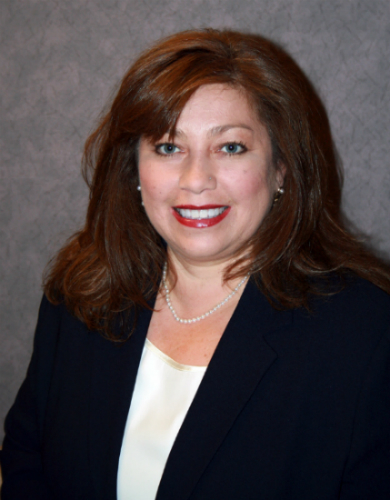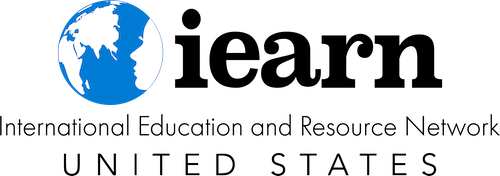iEARN-USA Executive Director Stefanie Ortiz-Cidlik Interviewed by Idea Clearing House
Posted on June 08, 2020

Stefanine Ortiz-Cidlik, the Executive Director of iEARN-USA, was interviewed by the Kids Can Make a Difference (KIDS) publication "Idea Clearing House" to discuss what inspired her to work in the non-profit educational sector, how iEARN projects empower youth, and the challenges and opportunities facing the iEARN community in the future. She emphasizes the importance of ensuring that youth have the ability to fulfill their potential and describes the ability of iEARN projects to connect children and teenagers with their global peers from around the world.
We have republished the full text of the interview below with the permission of Kids Can Make a Difference (KIDS).
Let's start with where you are from and your background
I am originally from Lincoln, Nebraska. Although I have made New Jersey my home and consider myself a global citizen, I imagine I will always be a Cornhusker at heart. Growing up, I was blessed with a very large, close-knit extended family. My mom was a single parent who owned her own business. In hindsight, that was probably quite unusual at the time. She worked six days a week and during busy seasons would put in 16+ hour days and even an occasional all-nighter. My mom relied on my grandparents to help raise and care for me. They had immigrated from Mexico to the US with their families, my grandmother as an infant and my grandfather as a teenager during the Mexican Revolution. My grandfather became a forklift operator for a local manufacturing company and my grandmother stayed at home to raise their twelve children.
My generation was raised on stories of past struggles, how the family, at times, relied on the generosity of programs like Operation Santa Claus for their holiday dinner. Despite the challenges, my grandparents raised twelve children (plus me) who are educated, active citizens. Among them, four became small business owners, four became educators, three became military veterans, and one became a police officer. My grandma and I were very close; she was certainly the biggest influence on me. She had a hard life, didn’t attend school and never learned to read nor write. My grandma taught her daughters to be self-sufficient and not to rely on a husband to take care of them; she believed in a good education. We were also taught to give back. Every year during the holiday season, our family continues to donate to Operation Santa Claus in honor of my grandparents.
The expectations and examples set by my mother and grandparents shaped and inspired me to be fiercely independent, to love trying and learning new things, and to work hard. I have a Bachelor’s degree in Business Administration with an emphasis in Human Resource Management and a Master’s degree in Management. My career has been primarily in the non-profit sector. Early in my career, I became a fundraiser for environmental and community action groups. I also worked for a national alcohol, tobacco and drug prevention program for youth, training and supporting teachers, guidance counselors and other youth workers to implement the program. For over 15 years, I held various administrative positions with the Girl Scouts, initially serving as the Director of Membership and Program of a small council in southeastern Nebraska, the Chief Operating Officer of a statewide council, and ultimately Chief Executive of USA Girl Scouts Overseas. In the latter role, I ran Girl Scouts’ international operations with programming in over 90 countries around the world with staff teams in NY, Italy and Japan.
As I reflect on my background, a couple of things are clear to me. The first is that I did not have a clear career path in mind, but I knew I wanted to do work that was meaningful, and I was always open to opportunities as they presented themselves. Secondly, I have always been drawn toward work that helps young people reach their full potential. I have always loved working with and being around young people. They challenge and inspire me.
What interested you in hunger and education?
I have always been interested in helping young people succeed and I truly believe education is the key to that success. I want every young person to believe they have what it takes to develop academic skills and that they have the right to access the kind of education needed to pursue their interests and passions. Many factors influence academic success, but one of the most impactful is hunger.
Children’s brains develop quickly, deeply needing nutrition to grow and function properly. Hunger, especially prolonged hunger, can have significant impact on the overall development, academic performance, classroom behavior and mental health of young people. Hungry children are more likely to have language and motor skill impairments, have lower math scores, are more likely to repeat grades, and have higher rates of tardiness and absenteeism due to illness. When you consider 1 in 7 children in the U.S. lives in hunger, we have an alarming problem. I’m really pleased that many iEARN projects address the issue of hunger and that we can be part of the solution.
What issues do you work on and why?
Today, I work on global education and leadership, giving young people the opportunity and framework to forge friendships across country boundaries, build empathy and understanding for people from different backgrounds and cultures, and develop global competencies and skills that will help them succeed academically and in the workplace.
Young people are smart and creative and want to make a positive difference in their communities and the world. iEARN gives them the platform and project framework to do just that. All iEARN projects are aligned with the Sustainable Development Goals. Through these projects, young people are exploring and working together to solve big issues like hunger, social justice and climate change,
There are many reasons why I do this work and why it is important to me. Probably most important is my belief that connecting and building meaningful friendships with people from cultures and backgrounds different from one’s own will change the world. I’m saddened to see how polarized and ethnocentric our country has become. Travel and exposure to different ways of life have certainly changed me for the better. By making connections with people from different places and backgrounds, we learn to see an issue from multiple perspectives, we begin to breakdown stereotypes and fears, we develop empathy for others, and we learn to work collaboratively. My hope is that every young person will have opportunities to grow in this way.
What I love about iEARN is that we offer both study abroad and virtual exchange programs. Less than 1% of students get to study abroad, but through iEARN’s virtual exchange program, students can meet and work with an international group of peers whether they can travel or not. This is important to me. As a young person, my family did not have the financial means to send me on a study abroad program. If I can help open the world to young people who have financial or other barriers, that is extremely gratifying.
COVID-19 is quickly changing the way we learn, work and live. This crisis has certainly emphasized the need to work together from remote locations. Luckily, iEARN has been doing that for over 30 years.
What are the biggest challenges for the issues that you care most about today?
Fear, money, and demands on teachers. In the last four years, the discourse in the U.S. has been fueled with hatred preying on people’s fears for what they don’t know. There has been a push to close our borders and limit contact with people from other countries, especially those very different from our own. In the last four years, we’ve seen the number of hate crimes against Latinos, Muslims and Arab Americans, and most recently Asian-Americans, increase. I worry that if the discourse and the political climate in the U.S. doesn’t change soon, it could have significant impacts on our ability to implement student exchange programs.
Like all non-profits, money is always a concern. With more funding, we could do so much more. We could invest in our technology to create a more engaging and impactful experience for the students. We could train and assist more teachers. We could support more students on international exchange programs. I worry that the impact the COVID-19 crisis has had on our economy will impact our funding and not only make it difficult to grow and expand as we planned, but also to maintain our current programs.
Finally, teachers are asked to do so much. For many the bulk of their classroom time is spent preparing students for state and district-mandated tests. Many teachers are struggling to get by and feel “burned out.” With the current crisis at hand, teachers are expected to teach remotely. It’s challenging to ask teachers to quickly develop new programs and remote methods of skills and activities for student learning. I worry that with so many other demands, teachers and administrators will overlook the value of connecting students to learn with the world.
What drives you?
A belief that all young people deserve the chance to reach their full potential and a desire to be a good role model for my daughter are the two things that drive me. What drives me? I’ve always viewed myself as a bit of a malcontent who’s never quite satisfied with the way things are. I’ve come to see, however, that I am actually quite the optimist. I really do believe that by working together we can create a better tomorrow. We can even the playing field to ensure all young people have the same opportunities to develop their skills, knowledge and emotional intelligence. That is what keeps me going.
In conclusion, what message do you want to deliver to our readers? What do you think your legacy should be.?
I hope I will be remembered for being a good mom and for raising a smart, beautiful, caring young woman. Young people are our future. As I mentioned before, they deserve a chance to reach their full potentials. That means every young person deserves to feel secure and confident that their daily basic needs will be met. It’s our responsibility to ensure every student has a learning environment that is supportive and encouraging, giving them the skills and tools, they need to succeed academically and in the workforce. I hope that I am remembered for making a positive difference in the lives of young people around the world.
Please subscribe to the Idea Clearing House (ICH) newsletter here.
